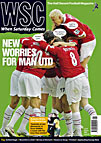 It's all in the small print. Ben Lyttleton tells us why Sir Brian Mawhinney is taking on the FA over the role of agents
It's all in the small print. Ben Lyttleton tells us why Sir Brian Mawhinney is taking on the FA over the role of agents
Sir Brian Mawhinney, the Football League chairman, has blamed the FA and the Premier League for failing to resolve the issue of dual representation of agents in a new set of regulations that were passed by the FA Council in November. He should have saved some of his frustration for FIFA, whose intransigence on clearing up an ambiguity in their regulations has turned the issue into a major debate.
The confusion has arisen over the interpretation of Article 14d of FIFA’s licensed players’ agents regulations, which reads that a licensed agent is required “to represent only one party when negotiating a transfer”.
The Football League and their clubs believe that “a clear conflict of interest” exists when an agent acts for the buying club in a transfer between clubs, at the same time as representing the player in contract negotiations with his new employers. Their fear is that the agent may not work in a player’s best interests if he is also working for the buying club.
The Premier League argue there is no conflict and point to the regular use of dual representation in European transfers as evidence that their clubs need it to compete in the transfer market. Their chairman, Dave Richards, is reported to have been working with several leading agents on establishing some form of self-regulation.
To avoid confusion over whether a transfer refers simply to the sale of a player to a club, the FA’s proposed raft of regulations changed the word to “transaction”, which covered both the sale of the player and subsequent contract negotiations. But the FA board removed this key clause covering dual representation in the new regulations that went before the FA Council, despite Mawhinney receiving assurances from Geoff Thompson, the FA chairman, and chief executive Brian Barwick that it would be included. “My clubs feel let down by the FA,” Mawhinney was quoted as saying at the Soccerex conference in Dubai. “The FA failed at the final hurdle when they were challenged with this and I hope FIFA throw the regulations back at them and say, ‘We do not accept these rules’.”
Mawhinney is justified in his frustration with the FA, whom he claimed are scared of the increasingly and dangerously influential Premier League. But he is wrong to expect FIFA to not accept the regulations, not only because their own ambiguous rules caused the problem in the first place, but because they seem in no hurry to sort out the confusion.
FIFA director of communications Markus Siegler told the Soccerex conference that it was virtually impossible for the organisation to police how its regulations were implemented by all its member associations. That is a worrying response from the game’s governing body, but perhaps unsurprising. After all, FIFA spent 13 months sitting on a dossier sent from the FA investigating the role of Bernie Mandic in the move of Harry Kewell from Leeds to Liverpool. Mandic was an unlicensed agent at the time though his company, Max Sports, received £2 million after the deal. But there was confusion over the role of Mandic’s brother, Nikola, who is a FIFA-licensed agent based in Australia. The FA were disappointed when FIFA’s players’ status committee ruled that FIFA “does not have jurisdiction to pass a decision because Harry Kewell’s transfer was not an international one”.
It promises to be a difficult January transfer window for the FA. The new regulations will be in operation, but without the clause Mawhinney wanted. His protests look set to continue into 2006 and he has even threatened to bring in a new set of rules to govern the use of agents within the League, which could include a clause forbidding clubs to pay agents. “This debate is being discussed at club level at the moment,” said a spokesman, who admitted that the Football League could bring in their own rules as early as next summer.
The FA have insisted the new regulations will do a lot of good for the game. “We strongly believe the game is best served by one set of regulations administered by the FA,” said an FA spokesman. “And we are confident these new regulations will improve transparency and tighten up agents’ activities.” The FA also confirmed that their board unanimously approved the new regulations. That board includes two representatives from the League, David Sheepshanks of Ipswich and Peter Heard of Colchester, just one reason why the League going alone on this remains unlikely.
But the row over dual representation is yet to be resolved. “The issue is still under discussion, it has not gone away,” said the FA spokesman. It seems that the best solution would be for FIFA to step in and clear up the mess themselves but, with their track record, that is likely to happen later rather than sooner.
From WSC 227 January 2006. What was happening this month